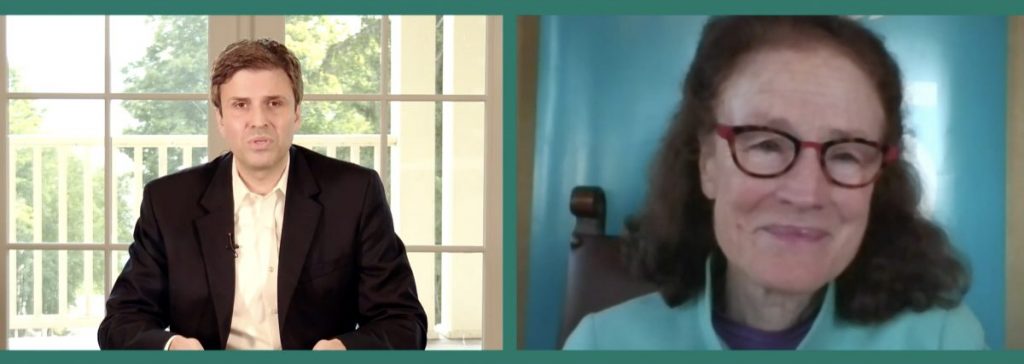
During childhood, people experience three major turning points regarding education. At around age 5, said Henrietta Fore, they should be ready to learn.
“This means in those first 1,000 days, you need enough good nutrition so that your brain and your bones develop, so you have a full chance to both live to survive, as well as to thrive,” said Fore, executive director of UNICEF.
The second point is at age 10, when Fore said children should be able to read and understand a paragraph or short story.
“(UNICEF is) worried about the quality of education around the world, especially in the poorest communities,” Fore said. “For many of the children, 40% or 60% can graduate out of primary school without having this ability to read and comprehend a simple paragraph.”
The third turning point is at age 18, when Fore said the child should have enough secondary school foundational life skills to learn an occupational skill to make a livelihood.
“Our greatest worry is that many of the children will now drop out,” Fore said.
She said because of the pandemic, 1.6 billion students were out of school, though some have started to go back into the classroom. Fore thinks that in the poorest countries and poorest communities, students — especially girls — are unlikely to have a chance to return to schools. In the poorest countries, she said students are tuning into class by radio and in middle-income countries, children are watching classes on TV. In high-income countries, such as the United States, she said, students go to school online.
At 10:45 a.m. EDT Thursday, Aug. 27, 2020, on the CHQ Assembly Video Platform, Fore held a conversation with Vice President and Emily and Richard Smucker Chair for Education Matt Ewalt titled “How to Help Children Reach Their Full Potential,” as part of the Chautauqua Lecture Series’ Week Nine theme of “The Future We Want, the World We Need: Collective Action for Tomorrow’s Challenges,” in partnership with the U.N. Foundation. Fore discussed the challenges children face across the globe, how the pandemic has changed UNICEF’s work, and the importance of education in a global context.
UNICEF works in more than 190 countries and territories, helping children survive, thrive and fulfill their potential. The U.N. organization supports children across the globe, focusing on education, sanitation, and the protection of young people against violence and exploitation. Its office and caseworkers also work to improve hygiene and health among young people.
Fore said that most mental health problems start to show by age 14, and young children who have experienced trauma show mental health issues even earlier.
“They will come in (to our caseworkers) and they will draw pictures of guns firing, people getting shot and names of members of their family,” Fore said. “They are reliving (trauma), and we need to make sure that we have safe places, that they can let their feelings be expressed, that they can talk to an adult and then they can learn how to deal with those feelings of anxiety and depression.”
UNICEF has offices in every country. Fore said the best practice to solve international issues is to work with local governments, so UNICEF is deeply involved in communities.
“We are hearing from people, and they are very worried. There is an enormous challenge ahead,” Fore said.
Many countries have been experiencing floods, others droughts, and she said locusts have hit eastern Africa. The COVID-19 pandemic has provided an additional challenge to communities across the world.
Community health care workers are absolutely essential to our fabric of life, and governments need to know that these are not just policies that they’re implementing or systems or people in offices,” Fore said. “These are people.”
“The number one request our country officers had when COVID first came to us was that the governments wanted to reach out to their people in every language,” Fore said, “(in) all the local dialects, as well as in the major languages, to tell them about COVID and how they could stay safe, and what it means to wash your hands and have good hygiene.”
Because much of the world does not have ready access to water and soap, she said it is difficult for homes, schools and hospitals to have good hygiene practices. UNICEF is spreading information about the pandemic to various countries with handbills, as well as on social media.
Ewalt asked how UNICEF social workers keep children safe, and how much governments invest in these employees.
“Community health care workers are absolutely essential to our fabric of life, and governments need to know that these are not just policies that they’re implementing or systems or people in offices,” Fore said. “These are people.”
She said these social workers are talking to parents and children in their daily lives, teaching them about immunizations, keeping children away from violence, the importance of education, and making sure the community has access to water.
“Many of (the social workers) have been falling ill. We are getting personal protective equipment out to everyone that we can. We have enormous demand around the world for this, but they risk their lives,” Fore said. “They didn’t miss a beat when COVID came. They just went out there and began talking and making sure that a community feels safe.”
Part of UNICEF’s work is also interacting with local and national governments.
“We are calling on every government to make sure that they do not cut their budgets on community health care workers,” Fore said. “All of our partners who are nonprofit organizations are trying to spread this word.”
Ewalt asked how the pandemic has affected prevention and response services for children who may be living in abusive households.
Fore said one of the ways UNICEF helps children is making sure every child can be identified by the government and has a nationality, meaning they are a citizen of a country, so they can be counted for school and have health care. As children get older, UNICEF focuses on protecting them from violence. She said one in four young people are in areas of conflict, and they sometimes are separated from their families.
“If you’re a very young child, it’s very hard to know your name, your parents’ names and the name of your village,” Fore said. “It’s hard sometimes for the caseworkers to know how to bring this child back to their family, but UNICEF does this with many of our partners, so that we reunify families; we want to be sure that children are not trafficked in these times of emergency.”
Fore said it is important to make sure the children that are safe and secure, have access to food, health care, sanitation and education.
“If you (are) separated, it makes you very distressed, very anxious; and children can just be crying,” Fore said. “When I was in Mozambique just after the cyclone, … roofs had been blown off of most of the homes. So often, families were separated and children and families ran to the schools, because the schools’ roofs were still on.”




